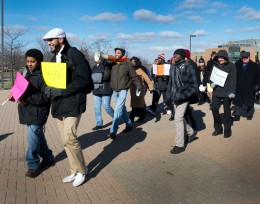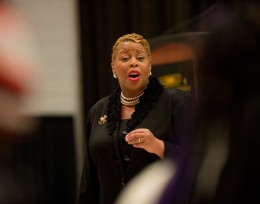
Students, faculty and staff take part in Wright State University’s second annual Martin Luther King Jr. march and rally.
Students braved bone-chilling temperatures to take part in Wright State University’s second annual Martin Luther King Jr. march and rally to honor the late civil-rights leader. They then met to discuss ways to fight discrimination and poverty.
Members of the group, which also included faculty and staff, on Jan. 22 gathered at five outlying parts of campus and then converged at Turning Points, the large red sculpture in the center of campus.
The marchers, some bearing signs bearing the words “Equality” and “World Peace,” then proceeded to the Student Union to hear a number of speakers and take part in a workshop on civic engagement.
King—a clergyman, activist and prominent leader of the African-American Civil Rights Movement—received the Nobel Peace Prize for his efforts to end racial discrimination. He was assassinated in 1968. In 1986, Martin Luther King Jr. Day was established as a U.S. federal holiday.

Kimberly Barrett, vice president for multicultural affairs and community engagement, speaks at the Martin Luther King Jr. event.
Excerpts from King speeches were read to the students, who assembled in the Apollo Room.
Kimberly Barrett, Ph.D., vice president for multicultural affairs and community engagement, told the students that King began working on the issue of poverty shortly before his death. And she urged the students to advocate for changes in the system that would reduce poverty.
J. Michael Bernstein, assistant dean of the Raj Soin College of Business, said that as a young student at Ohio Northern University, he heard King’s final college speech.
He called on students to do their part to end discrimination.
“Do what you can,” Bernstein said. “Let’s all work together.”
Catherine “Katy” Crosby, executive director of the city of Dayton’s Human Relations Council, said King’s dream was about equality for everyone. She read examples of hate crimes and acts of discrimination around the nation.
“We must move past our comfort zone,” Crosby said. “We must make intentional efforts to understand each other.”
Yi Li, Ph.D., dean of Wright State’s College of Science and Mathematics, told students how he and a small group of faculty members at the University of Iowa were able to increase the number of underrepresented minority students in the university’s Ph.D. mathematics program, largely by aggressive mentoring.
“We can all make a difference,” he said. “Be a catalyst.”

 Walking through open doors
Walking through open doors  Adventures await
Adventures await  Wright State to expand nursing facilities to meet workforce needs and prepare more graduates for in-demand careers
Wright State to expand nursing facilities to meet workforce needs and prepare more graduates for in-demand careers  Wright State student-athletes make a lasting impact on local family with more to come
Wright State student-athletes make a lasting impact on local family with more to come  Wright State names Rajneesh Suri dean of Raj Soin College of Business
Wright State names Rajneesh Suri dean of Raj Soin College of Business 